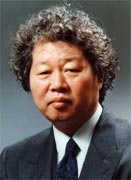 |
- JAXA has launched and what do you expect from JAXA?
Tachibana "Of course I have my hopes for JAXA, but I have more worries than hopes."
- What do you mean?
Tachibana "Well, I worry about organizational theory - 'Can this organization function well as an organization? - and about the future of science and technology research, the work that the three research institutes that were merged to form JAXA used to do. I ask, 'Will Japanese development of space technology work better?' 'How about science technology?' and 'What will happen to aviation?'
"I know well about those three research institutes through my coverage of them. In addition, I have extensive inside knowledge about the Institute of Space and Astronautical Science (ISAS), because I used to work there as a councilor. These three research institutes have an interesting history: when the ISAS was established from the Institute of Space and Aeronautical Science, University of Tokyo; or when two different lines of research - solid rocket at the University of Tokyo and liquid rocket at the Science and Technology Agency - were competing, or when the National Space Development Agency of Japan (NASDA) was established and black box technology was directly imported from America and applied to Japan's original rocket technology line, and so on. There have been a lot of problems, and I know a lot of difficulties in the past.
"It is clear that various problems will emerge, since different types of organizations from different fields, such as the Science and Technology Agency and the Ministry of Education, with different organizational principles and culture, are going to be merged. Basic problems could arise, for example, about paperwork, the way of thinking, sense of value, and institutional culture. However, I don't think those are the biggest problems, and I believe they are not insurmountable.
"I think the biggest problem concerns strategy; or rather the lack of strategy.
First of all, what are the implications of consolidating three research institutes? Aerospace technology is the national strategic technology, and work in that field was carried out by three different organizations. Of course there was a lot of waste and inefficiency in the system. I don't deny the consolidation can help cut down on waste. But as I look at the background of how JAXA was founded, those goals of administrative reform - to cut down on waste - seem to precede the principles that normally should come first, such as how to foster aerospace technology as Japan's national strategy, which direction it should go in, and what state organizations should do to lead and promote that technology."
 |
1/6 |
 |
|
 |



